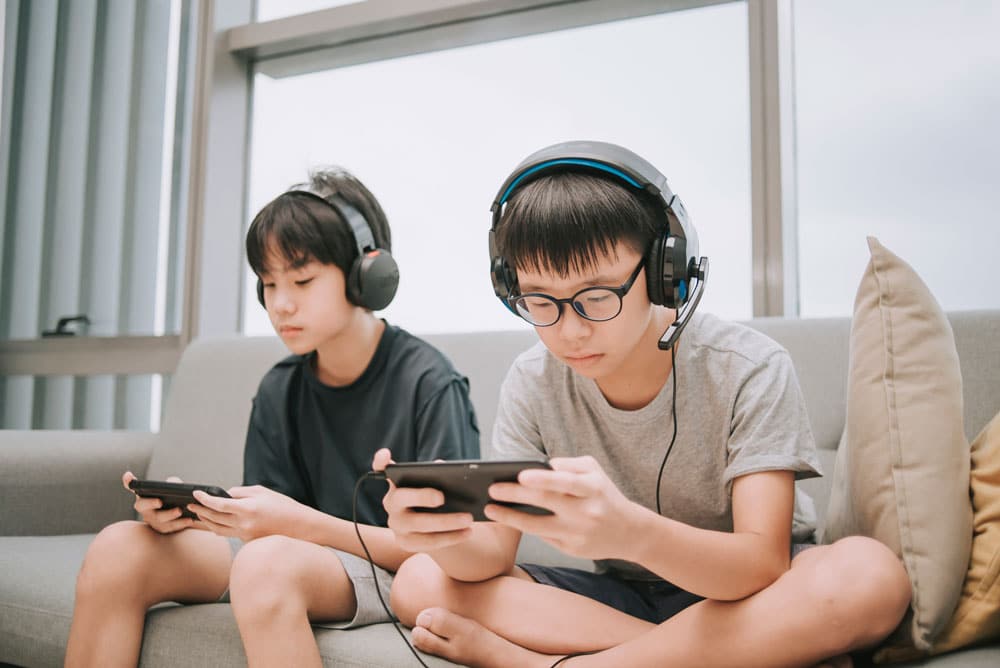By Wesley Gallagher
Technology. It’s everywhere, for better or for worse. Children, in particular, are surrounded by it. While many adults remember a time when there were no laptops or cell phones, kids these days have been holding iPhones since before they could walk, and it’s changing the way young people grow up.
Parents of young children are feeling the effects of these changes, watching their kids growing up faster than ever before, it seems: cell phones in elementary school, Instagram accounts in middle school, and by high school, some kids even have their own YouTube channels.
While kids and teens may be physically home, the majority of their time is spent elsewhere, via screens.
This leaves many parents feeling like they’re empty nesters before their chicks have even flown the coop. While kids and teens may be physically home, the majority of their time is spent elsewhere, via screens. So, how can concerned parents cope with these changes in childhood brought on by technology?
Tech and Social Media Effects on Teens and Children
There’s no question that technology has changed the way kids grow up. These statistics paint a clear picture of some of the changes:
- According to NPR, more than half of American kids own smartphones by age 11.
- A third of young people have viewed pornography by age 12, according to Culture Reframed.
- A 2016 Common Sense Media Census Report found about half of all kids use some form of social media by age 12.
Young people have a world of opportunities at their fingertips these days: cooking lessons, coding classes, YouTube videos about managing money or starting your own business, to name just a few.
Unfortunately, all this technology also presents children with access to things that children 20 years ago had little or no access to, such as explicit content and unsupervised interaction with people they don’t know. While it used to be pretty easy to keep young people from talking to strangers, they now have a whole world of them right at their fingertips.
Strangers aren’t the only people kids have to worry about online, either. From sexting to cyberbullying, phones and social media have become just another breeding ground for teens and adolescents to interact in inappropriate ways. Even simply scrolling through social media sites like Instagram has been shown to increase anxiety, depression, and low self-esteem in young people, according to Child Mind Institute.
Over-connected and Underdeveloped

But are kids these days really growing up faster than ever before? Well, not necessarily. According to CBS News, kids are maturing more slowly than previous generations in many ways, and experts believe it may be at least partially due to the time they spend online.
Compared to young people in the ’80s and ’90s, teens these days are less likely to be having sex or drinking alcohol, which most parents would say is a good thing. However, they are also less likely to have part-time jobs or drive, which is not quite as good news. So, while kids aren’t getting into things they’re too young to be doing, they also aren’t hitting typical milestones that help prepare them for adulthood.
Researchers believe time spent socializing on technology instead of in person may be partially to blame. Another thought is that helicopter-parenting and overscheduling are keeping children from gaining the independence they need to mature into functioning adults.
COVID, Technology, and Connection
If kids were overly dependent on technology before 2020, the COVID-19 pandemic did nothing to help the problem. Not only did school go completely online for most children, but technology also became the only form of socialization for young people.
According to an article in the Milwaukee Journal Sentinel, teens stayed connected via group texts and social media, which was great for social distancing, but not ideal long-term. Humans were designed for more connection than through a screen, so it’s important to help kids and teens ease back into in-person socialization. They may be nervous about getting back to normal and feel more comfortable in front of their phones, but it’s important for all of us to have real human connection.
How to Connect with Your Over-connected Child or Teen
If your children’s technology use has made you feel like an early empty nester, there’s good news. You are still the parent, no matter how grown up they think they are, and you are still in charge of them while they live in your house.
Especially if you have teens, it may seem like they’re too old to make changes, but it’s never too late to set boundaries around tech and social media usage in your household.
Especially if you have teens, it may seem like they’re too old to make changes, but it’s never too late to set boundaries around tech and social media usage in your household. The Erikson Institute lists several ways to manage technology use at home:
- It starts with you
Parents all know the harsh reality that children learn much more by watching what we do than by hearing what we say, and that goes for technology use too. Be intentional about how much technology you use around your kids, and make sure you are spending time away from screens when you are at home.
- Use technology with your children
Especially if you have young children, exploring technology together with your children is much better than letting them go it alone. This joint exploration promotes learning and increases engagement.
- Focus on what, not just how much
Pay attention to the quality of what your children are doing on technology, and encourage tech that emphasizes interactions, relationships, and social and emotional learning.
- Take tech breaks
Schedule family time where technology is not allowed. This will not only get your kids off their phones, but also enhance family connections so that kids will (hopefully) want to spend more time away from their screens while they are home.
- Encourage outdoor time
Nothing beats the outdoors, for kids of all ages. Whether you send the kids out back to play while you make dinner, or take a walk together as a family, outdoor time is a great alternative to screen time.
If you think your child’s tech usage has become a problem, or if you notice signs of depression, anxiety, or other mental health disturbances, it may be time to contact a professional. They can help you figure out the best course of action for getting your child or teen the help they need.

